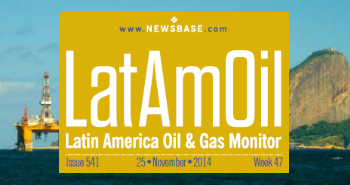TotalEnergies expands in Suriname, seeks to sell off Argentine shale assets

The French company is reprioritising assets in Latin America
WHAT TotalEnergies enters Suriname block, may exit Vaca Muerta fields
WHY Suriname is high potential, value of Argentina assets favours sale
WHAT NEXT Production in both areas will surge, with Suriname as the higher value option
France's TotalEnergies has expanded its presence in Suriname's offshore oil sector through the acquisition of a 25% stake in Block 53, while it is seeking to sell oil assets in Argentina's Vaca Muerta shale play.
Block 53 is strategically positioned adjacent to TotalEnergies' flagship GranMorgu development project, the company confirmed in a press statement.
The French energy giant acquired the Block 53 minority interest from Moeve, formerly CEPSA, joining APA Corporation (45%, operator) and Petronas (30%) as partners in the license. Block 53's location directly east of Block 58, where TotalEnergies holds a 40% operating stake in the GranMorgu project, offers significant synergies for future development.
"This acquisition brings new resources to the development of our low-cost and low-emission GranMorgu project," Javier Rielo, senior vice president Americas for exploration & production at TotalEnergies, stated. "It also proves how TotalEnergies will leverage GranMorgu infrastructure to develop profitably additional resources and extend its production plateau."
The timing coincides with major construction milestones for GranMorgu, Suriname's first offshore oil venture. SBM Offshore recently commenced fabrication of the project's FPSO vessel, designed to produce up to 220,000 barrels per day from approximately 30 wells. The vessel’s Multipurpose Floater C (MPF C) Fast4Ward hull was delivered to Suriname in February.
First oil in 2028
First oil is targeted for 2028, with the project estimated to hold 750mn barrels of recoverable resources.
TotalEnergies has simultaneously launched a comprehensive local content programme in Suriname, conducting an industrial baseline study that identified 45 existing supply chains. The company plans 14 initiatives across stakeholder engagement, governance, and supply chain management, targeting 10% local participation in operations teams within 2.5 years.
This programme will supplement the African Export-Import Bank’s (Afreximbank) decision to enter into a partnership with Suriname to establish a $5bn local content facility designed to strengthen the country's emerging oil and gas sector and broader economy, thereby further boosting local employment opportunities in the oil and gas sector.
Interest in Suriname’s offshore oil and gas potential expands beyond TotalEnergies, with Suriname's national oil company, Staatsolie, signing a production-sharing contract (PSC) with Petronas Suriname and Paradise Oil Company for offshore Block 66. This production block spans approximately 3,390 square km in deep offshore waters ranging from 1,000 to 2,200 metres in depth.
This strategic expansion appears to demonstrate TotalEnergies' commitment to building a substantial presence in Suriname's emerging oil sector, potentially positioning the company to capitalise on the country's transformation into a significant regional oil producer.
Argentina’s Vaca Muerta
Meanwhile in Argentina, TotalEnergies is in advanced discussions with at least two potential buyers for its shale oil assets there, capitalising on improved valuations under President Javier Milei's economic reforms, Bloomberg reported.
The divestment follows CEO Patrick Pouyanne's earlier indication that the company would consider selling Argentine field stakes at appropriate prices. The timing aligns with surging Vaca Muerta production, which reached 442,000 barrels per day (bpd) in April, marking a 22% year-on-year increase.
TotalEnergies holds 45% stakes in the La Escalonada and Rincón La Ceniza fields, located in an underdeveloped northern section of Vaca Muerta with significant potential. Shell maintains a matching 45% stake, while provincial company GyP del Neuquén owns the remaining 10%.
The French energy giant joins other international players, including ExxonMobil and Malaysia's national oil company Petronas, in exiting Argentine operations as Milei's reforms – particularly loosened capital controls – have boosted asset valuations. This creates opportunities for companies to sell and redirect capital elsewhere.
Notably, TotalEnergies' Argentine shale gas assets remain off the market, with the company leading efforts to establish Argentina as a major gas supplier to Brazil. This selective approach reflects the strategic importance of gas operations in the regional energy landscape.
Growing domestic interest
The exits contrast with growing domestic interest in Vaca Muerta, where lifting costs prove as low as $4.5-$4.6 per barrel according to S&P Global data. Vista Energy has emerged as a production leader, achieving a 36% surge in oil output during 2024 and leading Argentina's oil production with an average of 754,008 bpd in April.
Meanwhile, Argentine national oil company YPF has continued its divestment agenda for conventional assets to focus on unconventional development, recently approving the transfer of 12 additional conventional oil areas as part of its strategic pivot toward Vaca Muerta operations.
This strategic realignment reflects the evolving market dynamics of Argentina's energy sector under Milei's administration. While some international companies have decided to optimise their portfolios by capitalising on improved asset valuations in the short term, domestic players are increasingly driving growth in the world-class formation, thereby looking to drive long-term oil production and export growth.
The trend suggests that Argentina's energy future may increasingly rely on local expertise and investment, potentially reducing dependence on foreign operators while maintaining the capital flows necessary for the continued development of one of the world's most promising unconventional oil and gas resources.
The French oil company, however, is not exiting Argentina, and is promoting the Latin American country as a future gas supplier to neighbouring Brazil, which suggests a regional strategy focused on gas rather than oil, OilPrice notes.
Argentina, however, is looking like more of a gamble for oil companies now that a US judge has ruled that the country should divest its 51% share in national oil company YPF. That’s as partial compensation for its controversial 2012 nationalisation of the energy giant, dealing a significant financial blow to Milei's administration.


Follow us online